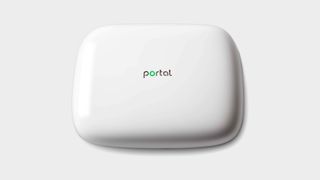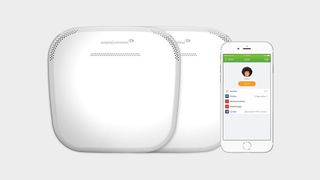
When your home or office is too large for a single Wi-Fi router to cover in wireless signal, a mesh router kit can help spread the signal. The best mesh router kits use a series of nodes, typically two to three, to blanket the home with the wireless signal, covering every nook, cranny and closet with a usable internet signal.
Currently, mesh networking gear can be divided into two designs. The “true mesh” design features a series of identical and interchangeable devices that all interconnect wirelessly. The second is known as a “hub and spoke” design, which uses a router and one or more wireless extenders. These days, both categories of gear are marketed and sold as a “mesh kit,” so we included both options in this guide.
A mesh network is not for everyone. For those that live in a smaller home or apartment, a single router probably works fine. But for more challenging home situations, such as a multilevel dwelling or a larger residence (say greater than 2500 to 3000 sq ft), a mesh router kit is worth considering.

1. Ignition Design Labs Portal Wi-Fi
The best pure mesh router kit for gaming
Link Rate: AC2400 | Wireless Specification: 802.11ac | Bands: Dual-band | MU-MIMO: Yes | DD-WRT Support: No | Security: WPA, WPA2
Ridiculously fast throughput
Able to prioritize gaming
Clunky setup
Lacks integrated security
If you’ve been waiting for a pure mesh system that offers a no compromises approach to throughput and gaming, then the Portal Wi-Fi kit is the closest yet. The Portal is the result of a Kickstarter from some ex-Qualcomm engineers, and is now produced by Ignition Design Labs and sold through the Razer store.
Portal’s specs are quite robust with AC2400 Wave 2 Wi-Fi, MU-MIMO, and a 4×4 radio for the 5 GHz spectrum. The smooth, curved shape houses nine internal antennas, with four Gigabit ports and two USB ports on the rear. It also uses additional 5 GHz frequencies known as U-NII. That spectrum is typically used for radar, but this router can use the frequency if it is clear via Dynamic Frequency Selection (DFS) technology—something that’s particularly useful for folks that run Wi-Fi in congested congested areas. Portal refers to this tech as Fastlanes.
The Portal performed well in our 2.4 GHz throughput tests with some wins among our tested mesh routers, but its 5 GHz speeds really blew us away. It dominated across the board, including a score of 551.06 Mbps at the close distance, making it faster than anything else tested. Results in our gaming test was also very strong, with a score of 25.433 FPS—the best FPS seen to date on a mesh router—while streaming our videos with only 5.70 percent of packet loss, whereas many other mesh setups drop frames up in the double digits.
The Portal retails for around $150 for one unit that covers 3000 sq ft, or a two pack for $378. In other words, it’s cheaper to buy Portal units à la carte, and add them back together on your own. On its own, a single Portal unit also works as an excellent router for smaller setups.

2. Amped Wireless Ally Plus
The best hub and spoke mesh router kit for gaming
Link Rate: AC2100 | Wireless Specification: 802.11ac | Bands: Dual-band | MU-MIMO: Yes | DD-WRT Support: No | Security: WEP, WPA, WPA2, WPS
Class leading speeds
Excellent Wi-Fi coverage
Optimizes gaming traffic
Cannot add additional extender
The Amped Wireless Ally fits into the router and extender category of the mesh family, with a high total coverage rating of 15,000 square feet. Typical deployment is for the router component to be near the modem, with the extender on a different floor in a central location. Both the router and extender are AC1900, featuring 2.4 GHz speeds of 600 Mbps, and 5 GHz speeds of 1300 Mbps.
While the other more pure mesh kits we tested lack Ethernet ports and USB port access, the Ally doesn’t force sacrifices in these areas. The router has three available Gigabit ports (the internet goes into a fourth port labeled “modem”), enough for a desktop, network printer, and NAS, for example. The extender, which connects via a dedicated 5 GHz band, even has a Gigabit port, so it can function as a wireless bridge.
The Ally features QoS settings to prioritize gaming traffic—and it shows. On our gaming network congestion test, the Ally was able to prioritize gaming traffic and keep the FPS at 24.72, with only a single latency spike. With the network saturated, many competitors struggle to maintain a FPS in the single digits. When it came to the throughput testing, the Ally had a similarly impressive performance, easily taking the pole position on three of the six benchmarks, the only mesh router to accomplish this.

3. TP-Link Deco M5
The best budget complete mesh solution
Link Rate: AC1300 | Wireless Specification: 802.11ac | Bands: Dual-band | MU-MIMO: Yes | DD-WRT Support: No | Security: WPA, WPA2
Comes with three pieces
Excellent congested network performance
Great gaming perofrmance
Distance and frequency performance lacking
The Art Deco movement from the 1920’s focused on sleek designs, and simple elegance, and if this school of design were to create a mesh router system, it would be TP-Link’s Deco M5 system. After struggling with other true mesh kits, the M5 is a breath of fresh air when it came to setup. We literally had the app downloaded, the nodes deployed, connected, and firmware upgraded in about 20 minutes- our smoothest setup ever of any mesh kit. Each node is a small disc, with a notched design on the top.
The spec speeds are slower than the competition, with N400 and AC867 Mbps, but the more concerning issue is that these units are not tri-band, which means there is no dedicated backhaul connection between the three nodes in the kit. However, pluses include integrated antivirus software, and more importantly for gaming, QoS that is user selectable to the type of traffic to prioritize, which we promptly set to “Gaming.” Other standout features include support for Amazon Alexa, and IFTTT.
In testing, the M5 got bested by the competition on each distance and frequency. However, what really separates the serious gear from the posers is the performance on the network congestion test, and here the M5 is respectable, with an average FPS of 19.8 on our gaming test, while simultaneously streaming five 1080p videos with <1% packet loss. While the M5 is a more than decent system, it did not keep pace with the more robust competition. But the three pack is available for $229, making it one of the more affordable prices for a full mesh kit.
How we test mesh router kits
All mesh kits are setup in a typical residential setting, with the internet provided via a cable modem. We set up each mesh kit as a two hub system, with the primary unit connected via wire to the cable modem (Optimum 200, DOCSIS 3.0, 12 x 4 channels, speeds 200/35 Mbps). The second node is on a higher floor, with several obstacles in the way, including a floor, a partial concrete wall, and metal ductwork. Throughput testing is performed via the same methods used for our Best Gaming Router Guide, with NetPerf software. We perform each throughput test three times:
By running these multiple throughput tests, this reveals the performance that the secondary node is providing.
In addition, we run a gaming congestion test. Here, the gaming client is connected via 5 GHz Wi-Fi, and running five simultaneous YouTube 1080P videos to provide network congestion. Then latency gets measured via PingPlotter software, and we see how this impacts gaming performance on a sample game of Medal of Honor: Pacific Assault, with the FPS (frames per second) measured via the software tool, FRAPS in a sixty second sample.
Some online stores give us a small cut if you buy something through one of our links. Read our affiliate policy for more info.

